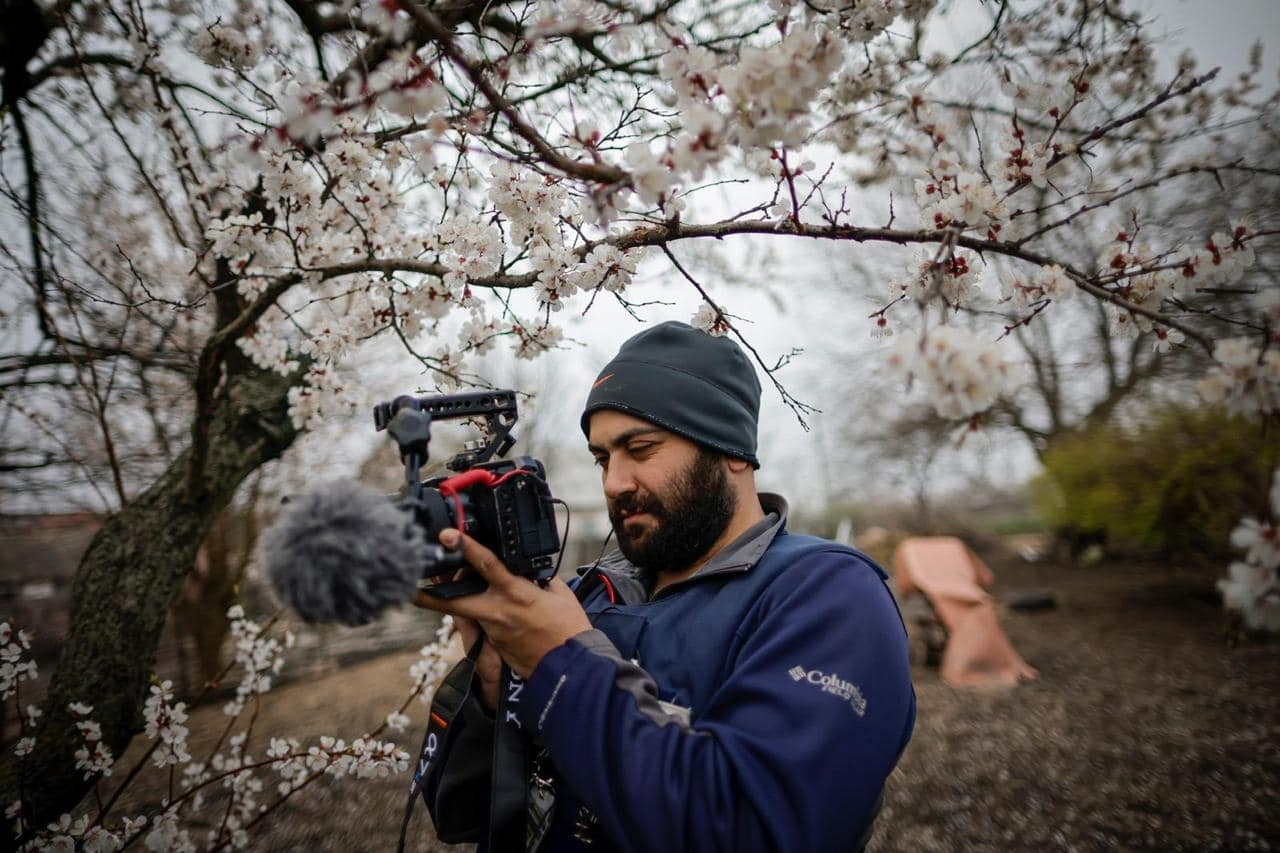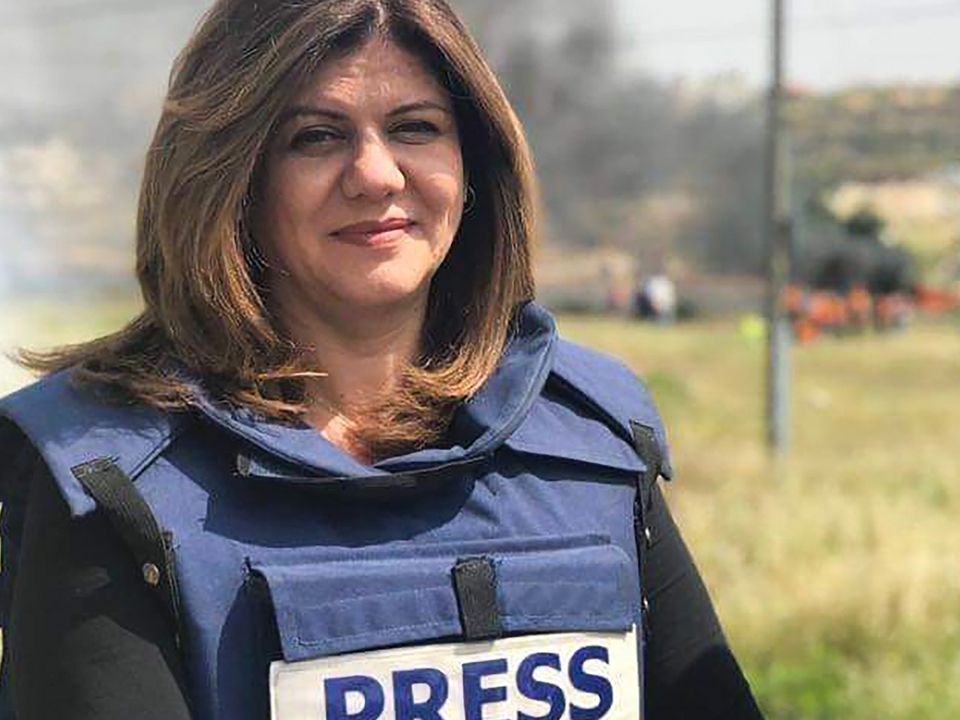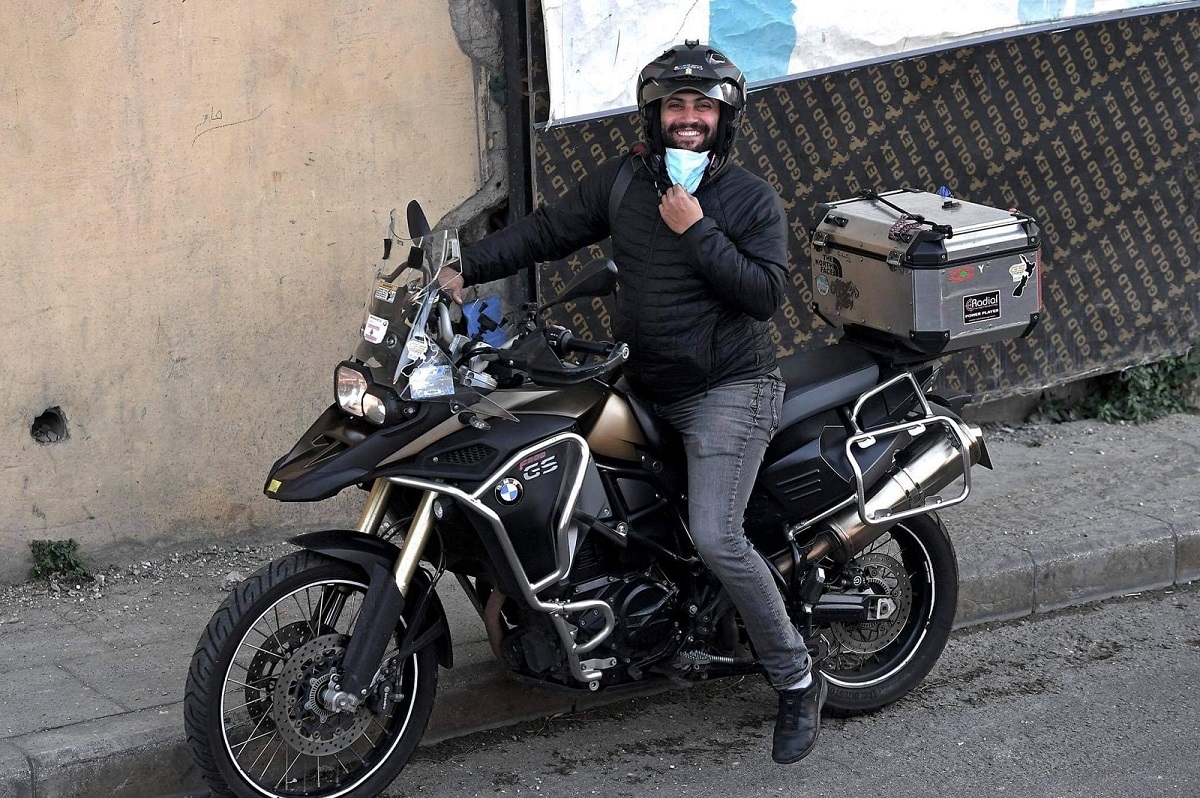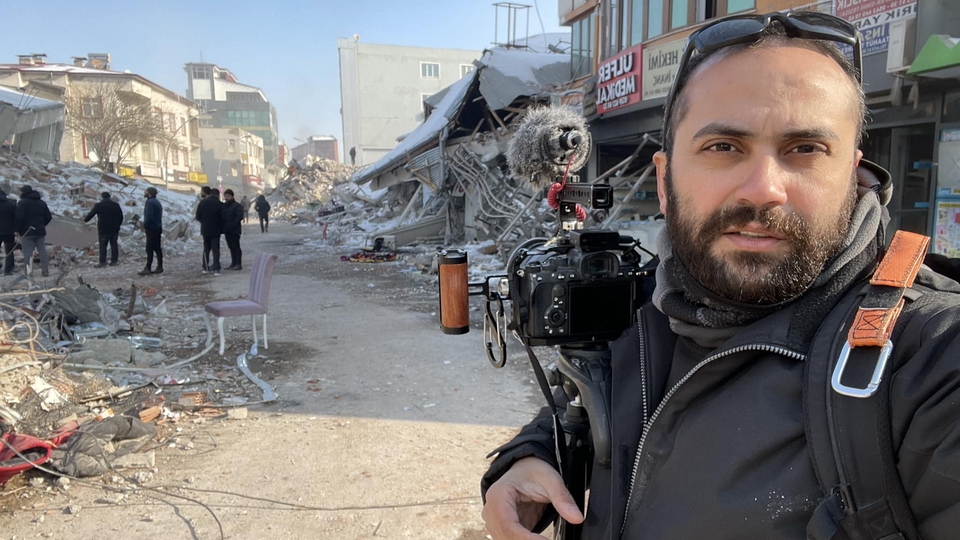Israel Killed Issam Abdallah but Cannot Kill the Story
We all knew Issam Abdallah. If you didn’t have a close personal relationship with him, you knew his name; and if you didn’t know his name, then you had seen him around Hamra. You could always find him riding his motorbike between Salon Beyrouth and cabaret-pub Metro Al Madina, standing at the foot of Metro’s stage photographing a show, or feeding street cats from the bag of cat food that he carried wherever he went.
Those who had never crossed paths with Issam learned who he was on Friday, October 13. Shortly after 6:00 p.m., two Israeli airstrikes targeted a group of seven journalists who were reporting from southern Lebanon, in a convoy of clearly marked press vehicles, near the village of Alma al-Shaab. The first airstrike hit Issam, who was on assignment for the Reuters news agency. It killed him instantly. He was 37.
Issam is far from the first — and won’t be the last — journalist to be targeted by the Israeli settler colony. As we go to press, Israeli occupation forces have murdered 42 journalists since October 8, when Israel began its genocidal campaign against Gaza. Well before that, the Israeli state was notorious for targeted killings of media workers, a pattern that began decades ago and culminated in the high-profile 2022 assassination of Al Jazeera correspondent Shireen Abu Akleh. But its rate of killing in this genocide — over one media worker a day — is even more extreme than usual. At the time of publication, the Committee to Protect Journalists (CPJ) declared a horrific milestone: the first 30 days of this genocide were the deadliest month for journalists since 1992, the year CPJ began documenting fatalities.
“He should be remembered as a courageous, dedicated journalist, who would never in his life neglect his duty no matter how much danger it posed.” —Ahmad Chihadeh, one of Issam's best friends
Issam’s loved ones remember him as a devoted friend, a courageous photographer, a committed journalist, and a “pure soul,” in the words of Ahmad Chihadeh, one of his best friends. “He loved doing road trips on his bike, he loved animals, and was always carrying pet food to feed stray dogs and cats, he loved food and was a good cook,” said Zeinoun Naboulsi, another one of Issam’s closest friends. “His favorite drink was single malt whiskey — you can ask Salon Beyrouth about that.”
At gatherings, you could always see Issam with a camera in his hand. He would shoot photographs or short videos of everything, from weddings and motorcycle road trips to just everyday hangouts. Once, his friend Mazen Hachem had to travel for work on his young daughter’s birthday. Issam surprised him by going to her birthday party — Mazen’s kids loved Issam — and taking photos of her and all of her friends. “He started sending me the photos,” said Mazen. “It was as if I was there.”
Among his friends, Issam was famous for making short, funny videos to commemorate any occasion. When one friend got married in 2018, Issam decided to rent one of Lebanon’s beloved old 1950s buses so that all of her friends could go together. “We were like 20–30 people, all wearing pink bow ties, and we went to the South,” said Zeinoun. “We got drunk on the way there, it was a 3-hour road trip. And Issam filmed a video, as usual.”

Issam (left of the bride), Zeinoun (right of the bride), Ahmad (back), and friends all wearing pink bowties for their friend Sara's wedding. Retrieved from Zeinoun Naboulsi's Instagram profile. Marjaayoun, Lebanon. December 2018.
Issam’s warm, heartfelt video shows each friend toasting the happy couple. He edited it to music, intercut with clips of the group buying beer from a dikkeneh, partying on the bus, and posing for group photos. “He loved every single detail in his work, and he loved to document everything,” said Ahmad. “He was a living archive.”
But no matter how much he loved hanging out with his friends, Issam would drop whatever he was doing the minute Reuters needed him. In 2016, Ahmad and Issam were on their way to Faraya when Russia’s ambassador to Turkey was assassinated. “He dropped me by the side of the road and told me, ‘I’m going to Turkey right now,’” Ahmad recalled. “Other times it’s an urgent ‘Ahmad, come drop me off at the airport on the motorcycle, I’m going to Jordan for a few hours, the office is sending me to cover a few stories.’”
Ahmad wanted the world to remember Issam as the friend who documented everything, and also as a journalist whose care and attention to detail carried over to his coverage of major world events. “He should be remembered as a courageous, dedicated journalist, who would never in his life neglect his duty as a journalist,” said Ahmad, “no matter how much danger it posed.”
“The First and Strongest Images”
Issam started working with Reuters as a freelance photographer and videographer in 2007, when he was still at university. He spent the next 15 years reporting on war and conflict in places like Iraq, Syria, and Ukraine.
“He was one of those journalists who was always covering ‘hot news,’” said Jad Shahrour, another one of Issam’s closest friends. “But he was never the kind of journalist to just put out a regular story — he was always looking for a side to the story that people hadn’t seen or noticed.”
“He always had a particular affinity for the B or C stories, not the A stories. I believe that these stories are what made him stand out as a journalist.” —Jad Shahrour, one of Issam's closest friends
In August 2020, a massive explosion tore through the Port of Beirut. As soon as he heard the explosion, Issam rode his motorbike toward it, calling Reuters’ London office on his way. He went live as he drove towards the rising smoke before he even knew what he was covering, one of Issam’s colleagues, who did not want to be identified, told The Public Source.
Reuters was the first news company to broadcast live from the scene of the explosion, according to Reuters’ communications office, “thanks to videographer Issam Abdallah, who rushed to the site to provide the first images of the aftermath from the port.” Issam’s fearlessness produced what Reuters would later describe as “some of the first and strongest images of the disaster.”
Issam’s coverage of the explosion had a lasting impact on people’s lives. He was among the first to cover the story of Liliane Cheaito, whose brain was so severely injured by the explosion that she was paralyzed and unable to speak. Other outlets picked up the story, and readers eventually donated so much money that her family was able to pay for her medical treatment. Issam continued to visit Liliane long after he filed the story; he was there two years later, when she was reunited with her son.

A photograph of Issam on the job in Ukraine. Retrieved from Issam's Facebook profile. Zaporizhzhia, Ukraine. April 18, 2022. (Photo Credit: Uesli Marcelino Silva)
Issam was nominated for Reuters Video Journalist of the year in 2020 for his coverage of the port explosion. He would later win that award in 2022, as part of a team of journalists, for their coverage of the war in Ukraine.
“In Ukraine or Iraq or Syria, he’d go and look for the story of a specific child, or the story of an animal — whether it’s looked after or not looked after,” said Jad. “He always had a particular affinity for the B or C stories, not the A stories. I believe that these stories are what made him stand out as a journalist.”
“We Were the Target”
On Friday, October 13, Issam went to south Lebanon to cover the Israeli military’s shelling of towns and villages along the Blue Line (the UN-designated line demarcating Lebanon from occupied Palestinian and Lebanese towns). He was traveling in a convoy of three vehicles, with six other journalists, all of whom were wearing press vests and helmets. At least one of the cars was clearly marked “press” on the roof. At 6:02 p.m., they were near the village of Alma al-Shaab.
The journalists were stationed on a hill about 3 kilometers away from the airstrikes they were covering, in order to do live broadcasts of the fighting. They should have been safe. “The shelling was on the other hill facing us,” said Carmen Joukhadar, an Al Jazeera correspondent who was in the convoy, “as we showed in the two lives we did before the strikes.”
Edmond Sassine, a journalist with LBCI, was broadcasting with his team less than 100 meters away from the group at the time of the airstrikes. “There was no shooting from where we were; that location was safe because it was never targeted,” he said in a Reporters Without Borders (RSF) investigation released on October 29. “Not a single stray bullet or shell fell there.”
Issam was sitting on a low stone wall, not far from Al Jazeera’s vehicle, when the first airstrike hit. According to Carmen, it killed him and critically injured Christina Assi of Agence France-Presse (AFP). Just over 30 seconds later, the second airstrike hit the vehicle, igniting it, and injuring Carmen and Elie Brakhia of Al Jazeera, Dylan Collins of AFP, and Thaer El-Sudani and Maher Nazeh of Reuters.
Israeli occupation forces have long targeted and attempted to silence Al Jazeera media workers. In 2017, Israeli Prime Minister Benjamin Netanyahu threatened to shutter Al Jazeera’s Jerusalem office and tried to expel Al Jazeera from all the territories the Israeli state explicitly controls; in its 2021 assault on Gaza, Israeli fighter jets flattened a Gaza City media tower that housed the Al Jazeera and Associated Press offices in a targeted airstrike; and last year, an Israeli sniper assassinated beloved journalist Shireen Abu Akleh.
In mid-October, the state of Israel’s Attorney General approved new regulations that would allow it to censor media outlets — namely Al Jazeera — that it deems harmful to national security or public order, or serving as “enemy propaganda.” On October 25 of this year, Israeli warplanes killed Gaza Bureau Chief Wael Dahdouh’s entire family in a targeted airstrike on the Nuseirat refugee camp in southern Gaza (a supposedly “safe” area to which Israeli occupation forces had previously ordered residents of northern Gaza to evacuate). And on November 9, Gaza City journalist Mohammad Mhawish, who has been reporting for Al Jazeera since October 7, received a personal phone call from an Israeli military officer ordering him to evacuate all 30 members of his family within 20 minutes or get bombed.
“Israel has once again attempted to silence the media by targeting journalists ... Israel's targeting of Al Jazeera team is a blatant disregard of international safety standards that clearly distinguish the press.” —Al Jazeera statement, October 14
Carmen believes the attack that killed Issam was yet another attempt to silence press coverage. She points to a disturbing incident that happened four days earlier. On October 9, 2023, Carmen, Elie Brakhia, and one other Al Jazeera colleague were reporting from the town of Marwahin when they saw an Apache helicopter fly overhead. They captured it on camera. Moments later, a missile landed next to their press car, just missing them. “The rocket landed near us,” she said. “We were the target.”
The October 13 attack was eerily similar. Around an hour prior, Carmen and Elie spotted and filmed an Israeli helicopter flying overhead; the RSF investigation concluded that Israeli occupation forces therefore must have seen and identified the journalists in the area.
Just before 6 p.m., as the journalists were doing their lives, an Apache flew overhead. LBCI’s live broadcasts captured it on camera. Seconds later, the first airstrike hit, killing Issam and injuring Christina; the second one hit the car — which was of the same model and color as the one targeted on October 9 — and injured the other journalists.
“Israel has once again attempted to silence the media by targeting journalists,” said Al Jazeera, in a strongly worded statement issued the day after the attack. Al Jazeera held the Israeli state “legally and morally responsible” for the attack and called on the international community to take action in order to ensure the safety of journalists.
“Israel's targeting of Al Jazeera team is a blatant disregard of international safety standards that clearly distinguish the press,” said the statement, pointing out that Israel burned Al Jazeera’s broadcast vehicle despite the presence of multiple international media outlets in an agreed-upon location.
Al Jazeera condemned the Israeli state’s repeated attacks on journalists, invoking its murder of Shireen Abu Akleh. In a sick twist of fate, Issam’s last post on Instagram, a week before he was martyred, was in memory of Shireen.

Issam's last Instagram post published on October 7, a week before he was killed by Israel, was in commemoration of Al Jazeera journalist and martyr Shireen Abu Akleh. His caption simply read, "Shireen ❤️"
“These threats and attacks will not deter our work or journalists,” said Al Jazeera, “as they will continue to convey the truth despite the many attempts to silence them.”
“We Will Not Lose Him Twice”
Issam’s killing has sparked deep anger — not only aimed towards the Zionist ethnostate, but also towards his employer. Reuters covered Issam’s death primarily in passive voice, initially failing to explicitly name the Israeli state as Issam’s killer, and later describing the missiles that killed him and injured his colleagues as being “fired from the direction of Israel.”
About two hours after Issam’s death, Reuters issued an ambiguous statement on the platform X (previously known as Twitter), saying: “We are deeply saddened to learn that our videographer, Issam Abdallah, has been killed,” and adding that “Issam was part of a Reuters crew in southern Lebanon who was providing a live signal.”
“We want to remind the world that journalists are not targets; their work is vital, and killing them will never kill the truth or the story. We will not lose Issam twice by giving up on this case.” —Doja Daoud, co-founder of the Alternative Press Syndicate
The Reuters statement did not name or even refer to Issam’s killers. Readers immediately added a community note — a crowdsourced correction or clarification, in which the platform’s users can add missing context to a tweet — pointing out that “Issam was killed by an Israeli artillery strike near the Israel-Lebanon border.”
“How shameful that you needed a community note to mention it was Israel who killed him,” one account tweeted in reply. “The least you could do as "journalists" and you failed your own employee who died covering for you. Shame doesn't begin to describe your cowardice.”
People all over the world — from Issam’s friends and colleagues to media workers, activists, and academics — have since called out Reuters for granting his killers continued impunity. “Reuters, who Issam worked for, did not accuse Israel,” wrote the Lebanese journalist Hazem al-Amine. “This is the first sign of complicity with the killer.” Most international media have adopted the same practice of omission since the war began, he pointed out in his column, which was headlined “On the premeditated murder of Issam Abdallah.”
The next day, after worldwide backlash, Reuters issued a news story saying that “a Reuters video journalist was killed and six other journalists injured in southern Lebanon on Friday when missiles fired from the direction of Israel struck them” — finally naming Issam’s killers, but still passively.
On October 16, Reuters Editor-in-Chief Alessandra Galloni issued a video statement, saying Issam “was killed on Friday October 13th when a shell hit him while he was filming cross-border fire between Israel and Lebanon” — emphasis ours — and that “witnesses at the scene said the shell that killed Issam came from Israel.” Galloni said she was “reiterating” her call to “Israeli authorities” to conduct a “swift, thorough, and transparent probe into what happened” — essentially asking the government of Israel to investigate itself. She did not name or call on any other entity or institution — such as the International Criminal Court, or the United Nations’ International Court of Justice — to investigate Issam’s killing. Given the settler colony’s abysmal track record at investigating its own abuses, asking Israel to conduct its own investigation is essentially closing the file.
Two weeks after the attack, the RSF investigation found that the Israeli military fired two airstrikes “of different intensity” at the journalists from behind the Blue Line, from two adjacent locations, suggesting a coordinated attack.
RSF’s investigation drew from videos the journalists themselves filmed before and during the airstrikes, the testimonies of those present, and ballistic analysts commissioned by RSF. The investigation, which includes a video reconstruction of the events of October 13, concluded that it was impossible for the Israeli military not to have known this group was a group of journalists. “The group has been targeted,” RSF stated. “Two strikes in the same place in such a short space of time clearly indicate this.”
Given the settler colony’s abysmal track record at investigating its own abuses, asking Israel to conduct its own investigation is essentially closing the file.
Lebanon’s Alternative Press Syndicate (APS), which Issam was a part of, has reached out to various United Nations (UN) agencies to demand an independent international investigation into Issam’s murder.
“We want to remind the world that journalists are not targets; their work is vital, and killing them will never kill the truth or the story,” said Doja Daoud, co-founder of the APS, adding that Issam was a colleague and dear friend. “Issam was dearly loved, and his killing is a huge loss for all of us. We will not lose him twice by giving up on this case.”
So far, Doja says, the APS has reached out to the United Nations peacekeeping force in south Lebanon (UNIFIL) and multiple UN special rapporteurs. The APS is also planning to send letters to UNESCO and the UN High Commissioner for Human Rights, asking them to denounce this crime and to initiate an investigation like the ones Forensic Architecture, the Washington Post, and the UN human rights commission carried out after Abu Akleh’s murder, which concluded that Israeli snipers intentionally targeted her. The press syndicate is also demanding compensation for Issam’s family and the injured journalists from their respective employers.
Most of all, she said, they want accountability for Issam. Vague statements, such as the ones Reuters and UNIFIL have issued so far, “help the killer get away with murder.”
“Israel sees journalists as targets because they help report the truth about its crimes,” Doja said. “They want a media blackout and they are achieving that by continuously obstructing, harassing, detaining, threatening, injuring, and killing journalists.”
“Justice is holding Israel accountable to all its war crimes for the last 75 years. And it still won’t bring Issam back to us.” —Zeinoun Naboulsi, one of Issam's closest friends
The Zionist ethnostate never paid a price for killing Abu Akleh. None of its allies or patrons withheld weapons or foreign aid, even after multiple investigations proved that her killing was a targeted assassination. The U.S. government — the Israeli occupation’s biggest backer, and the country responsible for Shireen’s welfare, since she was an American citizen — released a statement saying that gunfire from an Israeli army position “was likely responsible for the death of Shireen Abu Akleh,” but that it found “no reason to believe that this was intentional but rather the result of tragic circumstances.”
“He Treated Reuters as a Family”
None of the Israeli state’s allies will ever hold it accountable for killing Issam. It’s not likely that any governments or international institutions will either — let alone Reuters, his employer.
But those who knew Issam cannot accept that he was murdered for nothing. “Justice is holding Israel accountable to all its war crimes for the last 75 years,” said Zeinoun. “And it still won’t bring Issam back to us.”
The Palestinian resistance factions are currently holding over 200 prisoners of war in Gaza, with the intention of negotiating the release of the 5,200 Palestinians currently in Israeli detention. If Issam’s death contributes to their liberation in any way, said Ahmad, that will be a kind of partial justice, because the Palestinian cause meant a lot to Issam. “Issam’s blood went toward their liberation, toward their victory, and their return to their families,” said Ahmad. “This is something that consoles all of us.”
Issam’s killing enraged so many people all over the world that even the White House had to respond (with “prayers” from U.S. President Joe Biden). “Issam died the way he wanted to go,” said Ahmad. “He caused a ruckus, even as he went down. When he fell, his fall resounded; he shook the whole world.”
“He treated Reuters as a family. If they continue adopting this stance, they are complicit in Issam’s murder, and his blood is on their hands, too.” —Ahmad Chihadeh
To his colleagues, Issam was more than just a co-worker. They spoke of him as a dear friend, the person you always wanted by your side on assignment. “If you know Issam, you know he wanted to be there for everything and help,” Mazen Hachem, one of Issam’s best friends and a fellow journalist, said. “Whatever you needed, he’d support you.”
Issam was passionate about his job and involved in his colleagues’ lives beyond work. “Issam has worked for Reuters since 2007 — 2007!” said Ahmad, stressing the date and pointing out that Reuters had hired Issam on an international, not local, contract for the past five years. “He was dedicated to them his whole life. He treated Reuters as a family. It was never just about work for him.”
Ahmad wants Reuters to show his friend the same respect and care that he showed them — to treat Issam as family in return by fighting for him. “The media organization that he worked for, from the beginning to the end, should not fall into the wave of hypocrisy, and give in to threats from this or that side,” he said. “If they continue adopting this stance, they are complicit in Issam’s murder, and his blood is on their hands, too.”
The Public Source reached out to Reuters for comment on the news agency’s response to Issam’s killing. “Eyewitnesses at the scene said the shell that killed Issam came from Israel,” responded a Reuters spokesperson in a statement. “Our newsroom continues to gather facts about what happened. We will publish those findings in due course. And we have called on the Israeli authorities to conduct a swift, thorough and transparent probe into what happened.”
The Public Source also asked if the news agency would be calling on any entity other than Israel to conduct an independent investigation into this crime. “In all our reporting, we take extreme care to ensure that our journalism is factually based,” Reuters’ statement to The Public Source said. “In a case such as this, the tragic killing of one our [sic] staff, there is even further sensitivity and extra oversight. It is incumbent on us to be extra vigilant about applying our standards on sourcing and verification to ensure that our account is accurate in every respect.”
The statement concluded: “Issam was an experienced, talented and passionate journalist who was much loved by his colleagues here at Reuters. He was just doing his job when he was killed. Reporting on world events with accuracy, integrity, independence and freedom from bias is core to what we stand for at Reuters, and it is critically important for our journalists to be able to do so safely.”
“Executive Officer of the Sea”
Friends like Ahmad and Zeinoun are overwhelmed by the sheer number of memories of Issam accumulated over the years — from his absurd love of ketchup with his fried cauliflower, to his generosity, taking people and stray animals under his wing over the years, and his talent for wordplay. “He was a fun character who loved to make everyone laugh; he had a sharp, quick sense of humor,” Zeinoun said. “That’s how everyone remembers him; everyone who knew him has a dozen funny stories to tell about Issam.”
Lara Nohra, of Metro Al Madina, remembered one summer when the Metro team and their friends would all go to the beach in Sour every Sunday to snorkel and watch sea turtles together. Issam made name cards for each of the friends based on their personality. “He created things like ‘Executive Officer of the Sea,’” said Lara.

“He had opportunities to move wherever he wanted, but he told me, ‘I want to be in Beirut, riding a motorcycle next to you and Mazen.’” —Ahmad, Issam's best friend. October 20, 2021. (Photo Credit: Mohammad Salman)
Ahmad’s fondest way to remember Issam is the thing Issam loved most — Beirut. Issam stayed in Beirut, even when life in Lebanon became hard, all so that he could stay close to Ahmad and Mazen. “He had opportunities to move wherever in the world he wanted,” said Ahmad. “But he told me, ‘I want to be in Beirut, riding a motorcycle next to you and Mazen.’”
To Ahmad, Issam is Beirut, and Beirut is Issam. For his friends and family, Beirut is forever deeply connected to Issam — his memory lingering on every corner.
“He left a million things behind for me to deal with,” Ahmad said, with a sad laugh.“He left everything, everything, everything... From his car, to his things, to his house, to secrets, to acquaintances, to people... The entire city is his coffin.”
For Mazen, Issam is everywhere. “My daughter and son were crying last week and told me they miss Issam,” Mazen said. “I hugged them and told them: ‘he’s here, he’s around us.’”
